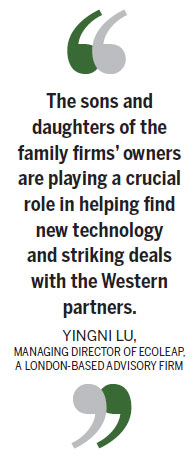Avoiding the generation trap
Updated: 2015-09-25 08:01
By Cecily Liu(China Daily Europe)
|
|||||||||||
In March, Oracle established a partnership with the Chinese asset and wealth management firm Shanghai International Trust to provide services for its family business clients looking for a more global reach. Shanghai International Trust will also help Oracle better communicate with its clients in China.

Davidenko says most of Oracle group's Chinese clients are first-generation owners already facing succession plan problems, but at the same time are looking to expand outside China or to diversify investments overseas.
The company has asset managers to help clients invest overseas to help spread risks. It also helps the businesses with global expansion plans, acquainting them with overseas rules and regulations, and helps them find overseas directors. It also helps them become more transparent, with better corporate governance structures in line with overseas markets.
In this process, Oracle group's knowledge of family businesses comes into play. For example, family businesses are more prone to resist introducing outside management when they expand overseas, but this is not the most efficient way to grow in a mature market, so Oracle group helps them find answers they are happy with.
Besides helping arrange schooling, the company can arrange internships for them so they will understand how to work in a Western business environment. Oracle group also uses its own charity trust to teach Chinese children how to do philanthropic work, another defining characteristic of successful family firms.
Because trust is a key aspect of Chinese family businesses' overseas expansion, some have managed to find partners through Opportunity Network, an invitation-only digital matchmaking platform that enables members to share business opportunities anonymously.
The network has more than 3,000 members in 75 countries, and one-fifth of the members are Chinese family businesses or family offices that advise Chinese family businesses.
The network grew from the Columbia Business School's Family Business Club, and in China it is a partner with four institutes of higher learning: Tsinghua and Hong Kong universities, Hong Kong University of Science and Technology, and the China Europe International Business School.
Brian Pallas, founder of Opportunity Network, says his staff has witnessed a large number of Chinese family businesses making overseas acquisitions in Europe, gaining high-end technology and expertise to take back to China.
This outward investment by Chinese family businesses has coincided with European family businesses selling some of their assets.
Some sellers want to diversify and invest capital in other countries, while others are forced to do so by the lack of liquidity stemming from the economic downturn in parts of Europe in recent years.
Some second-generation owners of Chinese businesses who have studied overseas start their career by setting up businesses in Western markets when they graduate, leveraging their parents' company resources as their competitive advantage, says Gong Hui, founder of Crescent Quant.
While at university, Gong tutored many Chinese students who are the children of first-generation business owners. "Many of them want to stay in the UK, as they believe they have a new platform that allows them to be much more international-minded, so they test the waters by starting businesses here".
One of his students who learned about fashion design in the UK has started a design studio, using fabric produced by her family's business in China.
Another, whose family operates a very successful restaurant in China, has established a restaurant in the UK using the same model, and through the family's connections has brought highly skilled chefs to the UK to cook authentic Chinese dishes. The UK business also has invited Western chefs to go China to offer Western food through the family restaurant.
"It may be difficult for many Chinese graduates to do business in a Western market, but resources and expertise built up through their parents' generation give them an edge in this market, and over time they can combine their own enterprise with their family business' activities to maximize the benefit of both businesses," Gong says.
Cui Zhijian, an assistant professor of operations management at the IE Business School, a graduate school in Madrid, says one major problem with Chinese family businesses' succession planning is the big differences in thinking between first and second- generation entrepreneurs.
Whereas the first generation is risk averse, as they have mainly focused their attention on the real economy by producing physical products, their children, who have grown up seeing big profits from financial markets, are keen to invest in high-return markets despite the risks.
Cui says the majority of Chinese second-generation entrepreneurs who have great confidence in the power of highly leveraged investments are largely influenced by the US financial market's ideology, which differs in important ways from the European markets, where many century-old family businesses have focused on safe and steady growth.
In Spain, two well-known family businesses are the fashion brand retailer Zara and the Spanish bank Santander, both of which have become very large while keeping their family business mentality, Cui says.
"These businesses have great risk management skills because the family members control a large stake in the business, therefore their mentality is much more careful compared with hired management, and their thinking is more long term."
Santander was one of the banks least affected by the financial crisis in 2008 because, as a family business, it avoided high-risk, high-return derivative financial products, and its slower growth was compensated by stability during the crisis.
Today's Top News
Saudi king orders probe as death toll set to rise
China willing to cooperate with US on cybersecurity
New economy drives growth
Hundreds killed in Saudi Hajj stampede
Volkswagen to pick Porsche boss as new CEO
EU leaders claim unity regained, pledge aid for Syrians
Business leaders, experts applaud Xi's speech in Seattle
Premier encourages innovation
Hot Topics
Lunar probe , China growth forecasts, Emission rules get tougher, China seen through 'colored lens', International board,
Editor's Picks

|

|

|

|

|

|






